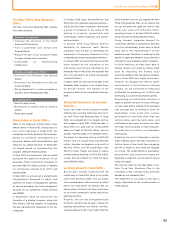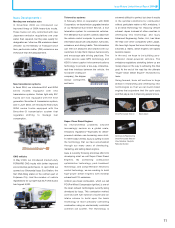Isuzu 2004 Annual Report Download - page 17
Download and view the complete annual report
Please find page 17 of the 2004 Isuzu annual report below. You can navigate through the pages in the report by either clicking on the pages listed below, or by using the keyword search tool below to find specific information within the annual report.
Management's Discussion and Analysis of Financial Condition and Results of Operations
17
Isuzu Motors Limited Annual Report 2004
Results of Operations
Significant accounting policies
The consolidated financial statements of the Isuzu group are prepared in
accordance with the generally accepted accounting principles of Japan. In
the preparation of these statements, the amounts recorded for items
including bad debt allowance, inventory, investments, income taxes,
retirement benefits, and provisions for product warranties are estimates that
reflect the judgment of management. Because of the uncertain nature of
estimates, in some cases actual results may vary from initial estimates, and
this may have a negative impact on earnings results.
Sales
In fiscal 2004 (ended March 31, 2004) Isuzu’s consolidated-basis sales rose
6.0% from the previous year to ¥1,430,339 million, as worldwide vehicle unit
sales edged up 0.9% to 280,418 units.
In the Japanese commercial vehicle market, new emissions regulations that
came into force in October 2003 sparked a sharp increase in demand for
trucks, particularly in the Kanto region surrounding Tokyo. As a result, overall
demand for heavy- and medium-duty (4 tons and up) trucks grew from
78,601 in the prior fiscal year to 117,143 units and demand for 2–3 ton trucks
rose from 95,325 units to 147,106 units. In this environment, Isuzu expanded
its market share in heavy- and medium-duty trucks by 0.9 percentage points
to 24.9% and by 2.2 percentage points in 2–3 ton trucks to 36.1%. As a
result, domestic vehicle unit sales jumped 66.5% from the prior year to
103,027 units and overall domestic sales swelled 32.4% to ¥627,364 million.
Sales in Asia jumped 59.6% to ¥336,217 million thanks to brisk sales in
places like ASEAN and China, where Isuzu took the lead in expanding
overseas. In particular, in Thailand we have won a 40% share of the market
for pickup trucks and a 25% share of the overall vehicle market.
North American sales fell 33.4% to ¥251,563 million as we worked to
improve marketing efficiency, right-size inventory, and implement appropriate
incentive programs as part of our effort to build a realistic business structure
for the region.
Sales in other regions declined 25.1% to ¥215,194 million, principally
because the Polish engine manufacturing operation is no longer considered a
consolidated subsidiary.
Operating income
Our operating income for fiscal 2004 was a record ¥84,490 million, up
446.4% from a year earlier. Changes in the composition of sales had a
¥39,100 million positive impact on operating profit, streamlining efforts in
procurement ¥24,000 million, and workforce reductions and reduced
expenses in our North American operations ¥45,600 million. On the other
hand, increased costs in areas like domestic sales incentives had a ¥10,500
million negative impact, the exclusion of the North American and Poland
engine units ¥7,800 million, and foreign exchange fluctuations ¥2,500 million;
also, a payment from GM of engine development costs as part of our alliance
formed in the prior fiscal year surfaced in this year's numbers as an apparent
¥18,900 million decline over the previous year.
Looking at each of our key business areas, operating income at the parent
company jumped ¥53,867 million from the previous year to ¥66,995 million as
it cut expenses and boosted sales, while operating income at our
consolidated dealerships in Japan rose ¥4,075 million to ¥7,525 million.
In North America, our operating loss shrank ¥22,677 million from the prior
year to just ¥1,360 million thanks to the measures we have taken to
restructure the business.
In ASEAN, operating profit grew ¥4,503 million to ¥7,182 million due largely
to brisk sales of our new pickup truck.
(The figures shown for each of our key business areas above reflect the
simple addition of the profits and losses of the parent company and
consolidated subsidiaries, grouped according to the characteristics of each
unit.)
As a result, our operating margin widened from 1.1% in the prior year to 5.9%
in the year ended March 2004, indicating a substantial improvement in our
earnings structure.
Non-operating gains/losses
In fiscal 2004 we incurred a non-operating loss of ¥2,813 million, down
¥16,849 million from the prior year. Our net interest expense declined ¥4,316
million to ¥11,257 million thanks to debt repayment. With the addition of the
North American and Polish engine manufacturing operations, equity-method
affiliates contributed ¥10,362 million of income, compared to a ¥726 million
loss in the prior year. Foreign exchange losses declined ¥1,917 million to
¥2,181 million.
Extraordinary gains/losses
In fiscal 2003, Isuzu booked ¥107,327 million in extraordinary charges as we
implemented an early retirement program, reorganized our North American
operations, and contracted our SUV business with the aim of eliminating
uncertainties. However, in fiscal 2004 extraordinary expenses shrank to
¥26,321 million, mainly associated with the overhaul of our domestic sales
network, adjustments to our real estate holdings in preparation for the
introduction of impaired asset accounting, and the reform of our North
American business.
Taxes
In fiscal 2003, after a rigorous review of our deferred tax assets, Isuzu's net
tax expense, including corporate income taxes, municipal taxes, and
business taxes and after adjustments was ¥30,451 million; in fiscal 2004 the
figure was a positive ¥77 million.
Minority Interests
Minority interests consist primarily of profits returned to the minority
shareholders of our locally incorporated subsidiaries in ASEAN and North
America. The figure declined from ¥2,323 million in the prior year to ¥720
million yen in fiscal 2004.
Net Profit
In fiscal 2004 our net profit was a record ¥54,713 million, a substantial
improvement from the prior year’s loss of ¥144,301 million. Our earnings per
share were ¥72.37, compared to a negative figure of ¥131.34 in the prior year.
Our fully diluted earnings per share for fiscal 2004 were ¥20.90.
Segment Information
Japan
In Japan, overall demand grew sharply due to the introduction of stricter
diesel emissions rules, and at Isuzu domestic sales rose 13.0% from a year
earlier to ¥1,064,992 million thanks to our aggressive marketing of vehicles
designed with our customers’ needs in mind. We introduced a number of
vehicles that exceed these new emissions rules, and the market response
was favorable. Operating profit greatly improved, swelling 299.7% to ¥77,201
























